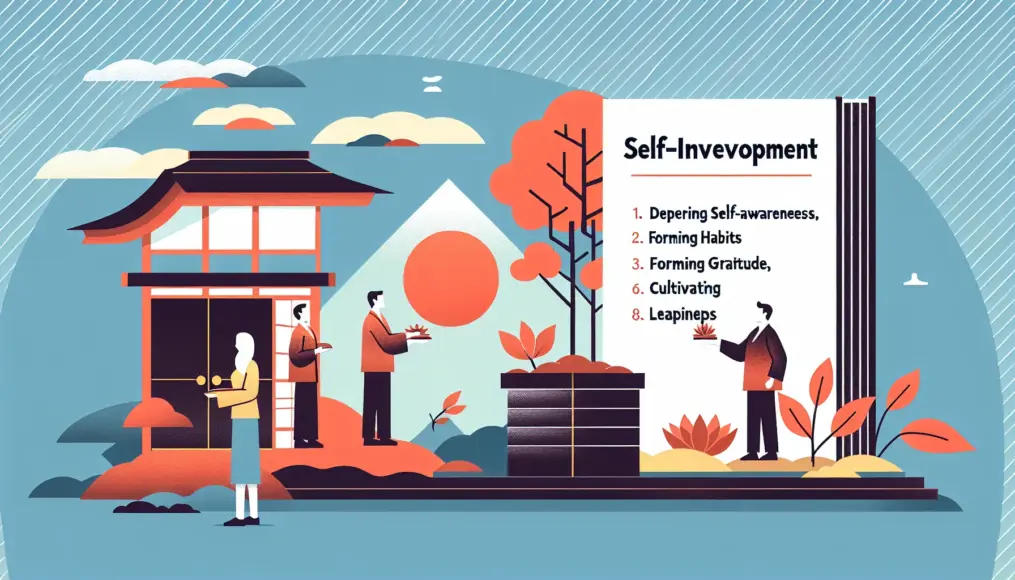Self-development is a vital process that allows us to reflect on ourselves and foster personal growth. Incorporating self-development techniques can be a powerful way to steer your life in a more positive direction. In this article, we’ll delve into some recommended self-development methods and their benefits. Together, we’ll explore how understanding yourself, setting goals, and enhancing your sense of happiness can transform your life.
For those looking to make a change or seeking a more fulfilling existence, self-development can be a tremendous ally. Conducting thorough self-analysis and identifying methods that resonate with you are key to achieving success. This article is packed with tips to brighten your future, so be sure to read through to the end.
- An overview of the basics of self-development and its significance
- Recommended self-development techniques and practical ways to implement them
- Key points for discovering the self-development methods that suit you best
What is the Foundation of Self-Improvement?
Self-improvement is the process of becoming a better version of yourself. It involves deepening self-awareness, setting goals, and exploring methods and mindsets to unlock your potential and encourage personal growth. Many people pursue self-improvement to enhance their lives and strive for more fulfilling daily experiences.
So why is self-improvement important? It serves as a crucial step in promoting personal growth and enhancing the quality of life. By understanding yourself and working towards the future you desire, you can achieve positive changes. Let’s take a closer look at the specific definition of self-improvement and its significance.
Defining Self-Improvement
Self-improvement refers to activities and methods aimed at maximizing your potential. This includes various elements such as self-analysis, goal setting, skill enhancement, and habit improvement. Through self-improvement, you can deepen your self-understanding and identify your strengths and weaknesses, allowing you to take more effective actions.
Moreover, self-improvement isn’t just about acquiring knowledge; it’s essential to foster growth through practice. By adopting new habits and continuously challenging yourself, you can facilitate your own personal development.
- Self-improvement is a process that promotes personal growth
- Self-analysis and goal setting are key components
- Developing new habits enables personal growth
Why is Self-Improvement Important?
The importance of self-improvement lies in its direct correlation to personal growth. Understanding yourself is vital for making life choices and determining your direction. Engaging in self-improvement can boost your motivation and self-efficacy, making it easier to overcome difficult situations.
Additionally, self-improvement can positively impact relationships and work performance. When you know yourself well and focus on growth, communication with others becomes smoother, and it’s easier to build trust. In this way, self-improvement becomes a vital element in bringing about positive changes across all aspects of life.
If you’re interested in self-improvement, check out this article on “Setting Self-Improvement Goals: Practical Examples and Methods for Success”. It offers insights on how to further promote your personal growth through goal setting, along with specific practical examples to enrich your self-improvement journey.
- Self-understanding is crucial for life choices
- Enhances motivation and self-efficacy
- Positively influences relationships and work outcomes
Recommended Self-Improvement Techniques
When it comes to self-improvement, there are numerous techniques to explore, and finding the right method for you can be a shortcut to success. Among the most popular approaches are mindfulness and goal setting. By incorporating these techniques into your life, you can deepen your self-understanding and foster personal growth. Let’s take a closer look at some specific methods.
Practicing Mindfulness
Mindfulness is a method focused on bringing your attention to the present moment. Many people practice it to reduce stress and achieve a sense of inner peace. Practically speaking, you can cultivate mindfulness by focusing on your breath or accepting your emotions, helping to stabilize your mental state.
Integrating this technique into your daily routine makes it easier to recognize your feelings and thoughts. As a result, you deepen your self-awareness, reduce stress, and improve your concentration. Mindfulness is not just about relaxation; it’s a powerful tool for personal growth.
- Mindfulness is a way to concentrate on the present moment
- It helps reduce stress and brings inner peace
- It deepens self-understanding and improves focus
Goal Setting and How to Achieve It
Setting goals is a crucial step in the journey of self-improvement. Having specific goals clarifies your direction and allows you to experience a sense of achievement. By using the SMART criteria (Specific, Measurable, Achievable, Relevant, Time-bound), you can set effective goals.
Once your goals are defined, it’s essential to create a plan to achieve them. Breaking your objectives down into smaller, manageable steps allows you to progress towards your goals without feeling overwhelmed. Regularly checking your progress and adjusting your plan as necessary will help you reach your goals more effectively.
- Goal setting is an important step in self-improvement
- Effective goal setting using the SMART criteria
- Achieve your goals step by step without feeling overwhelmed
The Impact of Self-Improvement
Engaging in self-improvement practices is known to yield a variety of positive effects. Among these, enhanced leadership skills and increased happiness are significant outcomes that many individuals experience firsthand. By gaining a deeper understanding of oneself and committing to personal growth, one can expect an overall improvement in the quality of life. Let’s delve deeper into these effects.
Enhancing Leadership Skills
Self-improvement is a vital key to boosting leadership abilities. By understanding your own strengths and weaknesses, you can communicate more effectively with others and build trust-based relationships. Furthermore, having clear goals helps cultivate the ability to guide those around you.
To enhance leadership skills, self-analysis and the acceptance of feedback are crucial. Reflecting on your actions and identifying areas for improvement will set you on the path to becoming a better leader. Through this process, you’ll find that you can positively influence those around you.
- Self-improvement is key to enhancing leadership skills.
- Understanding your strengths and weaknesses fosters better communication.
- Accepting feedback and identifying areas for improvement is essential.
Increasing Happiness and Gratitude
Self-improvement also has a profound effect on boosting happiness and gratitude. As you gain deeper self-understanding, it becomes easier to recognize what truly makes you happy. Additionally, cultivating a sense of gratitude allows you to notice the small joys in everyday life.
Practicing self-improvement nurtures positive thinking and equips you with strategies to cope with stress. This leads to a more fulfilling daily experience and helps sustain your sense of happiness. By fostering a grateful mindset, you can enhance your relationships with others, ultimately enjoying a richer life.
- Self-improvement enhances happiness and gratitude.
- A deeper understanding of yourself makes it easier to find happiness.
- Positive thinking flourishes, and stress-coping strategies are developed.
Finding the Right Self-Improvement Method for You
To truly harness the power of self-improvement, it’s essential to discover a method that resonates with you personally. Since everyone has unique preferences and approaches, understanding yourself is the first step. By engaging in self-analysis, you can clarify your strengths, interests, and values, enabling you to choose the most suitable strategies for your growth. Let’s delve deeper into the importance of self-analysis and how to make choices based on your values.
The Importance of Self-Analysis
Self-analysis is the foundational step toward self-awareness. By reflecting on your past experiences, strengths, weaknesses, and interests, you can pinpoint which self-improvement methods will work best for you. This insight makes it easier to identify the direction in which you want to grow.
Furthermore, engaging in self-analysis helps you set clearer goals. When you understand your values and the direction you wish to pursue, you can create more specific and achievable objectives. This clarity makes the self-improvement process significantly more effective.
- Self-analysis is the first step to knowing yourself
- Reflecting on past experiences and strengths helps identify the right methods
- Clearer goal-setting leads to more achievable targets
Making Choices Based on Your Values
Understanding your values is crucial in the self-improvement journey. When you know what matters most to you, you can select methods that align with those values. For instance, if you prioritize personal growth or relationships, you might choose specialized techniques that cater to those areas.
Making choices based on your values enriches the self-improvement process. By focusing on what you genuinely desire, you’ll boost your motivation and find it easier to track your progress. Selecting methods that suit you will lead to better outcomes in your journey.
As you deepen your self-analysis, you’ll clarify your values and goals. If you’re looking for more specific strategies, check out this article on “Psychological Approaches to Life Planning”. It offers practical techniques to understand yourself better and set meaningful goals, providing valuable insights for a fulfilling life.
- Understanding your values is essential
- Choosing methods that align with your values enhances self-improvement
- Higher motivation makes it easier to track your growth
Summary
Self-improvement is an essential journey toward enhancing the quality of our lives. By understanding ourselves and incorporating methods that foster personal growth, we can expect to see improvements in our leadership skills and overall happiness. Engaging in self-analysis and making choices aligned with our values allows us to discover the strategies that work best for us, leading to more effective self-development.
The benefits of putting these practices into action are far-reaching, contributing not only to personal growth but also to better relationships. Finding the self-improvement techniques that resonate with you and integrating them into your daily life is crucial. So why not take that first step toward a richer life right now?
- Self-improvement is a process for enhancing life
- Self-analysis and value-based choices are key
- The benefits gained through practice lead to personal growth and improved relationships
Wishing you an incredible journey in your self-improvement endeavors! We’d love to hear your thoughts on this article and any personal experiences you’d like to share in the comments below.












































Comment